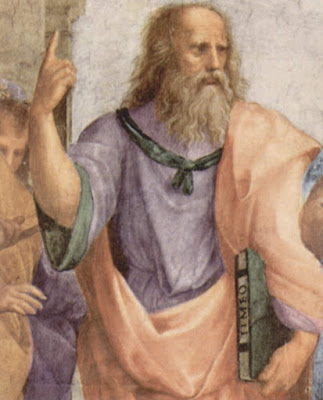On Virtues:
Plato, when he speaks of "likeness" as a "flight to god" from existence here below, and does not call the virtues which come into play in civic life just "virtues," but adds the qualification "civic," and elsewhere calls all the virtues "purifications," makes clear that he postulates two kinds of virtues and does not regard the civic onnes as producing likeness.
What do we mean when we call these other virtues "purifications," and how are we made really like by being purified? Since the soul is evil when it is thoroughly mixed with the body and shares its experiences and has all the same opinions, it will be good and possess virtues when it no longer has the same opinions but acts alone - this is intelligence and wisdom - and does not share the body's experiences - this is self-control - and is not afraid of departing from the body - this is courage - and is ruled by reason and intellect, without opposition - and this is justice.
Η επειδη κακη μεν εστιν η ψυχη συμπεφυρμενη τω σωματι και ομοπαθης γινομενη αθτω και παντα σθνδοξαζοθσα, ειη αν αγαθη και αρετηνεχοθσα, ει μντε σθνδοξαζοι, αλλα μονη ενεργοι - οπερ εστι νοειν τε και φρονειν - μητε ομοπαθης ειη - οπερ εστι σωφπονειν.
As the spoken word is an imitation of that in the soul, so the word in the soul is an imitation of that in something else: as the uttered word, then is broken up into parts as compared with that in the soul, so is that in the soul as compared with that before it, which it interprets.
There is no sin in anything of this sort for a man, but only right action. Our concern, though, is not to be out of sin, but to be god.
Εστι μεν ουν ουδεν των τοιουτων αμαρτια, αλλα κατορθωσις ανθρωπω αλλ η σπουδη ουκ εξω αμαρτιας ειναι, αλλα θεον ειναι.
But when he reaches higher principles and different measures he will act accordingly to these - for instance, he will not make self-control consist in that former observance of measure and limit, but will altogether separate himself, as far as possible, from his lower nature and will not live the life of the good man which civic virtue requires. He will leave that behind, and choose another, the life of the gods: for it is to them, not to the good men, that we are to be made like. Likeness to good men is the likeness of two pictures of the same subject to each other, but likeness to the gods is likeness to the model, a being of a different kind to ourselves.
Well Being Increases with Time:
It is ones inner state which produces both well-being and any pleasure that results from it. To place well-being in actions is to locate it in something outside virtue and the soul; the activity of the soul lies in thought, and action of this kind within itself, and this is the state of well-being.
η γαρ εωεργεια της ψυχης εν τω φρονησαι. Και τουτο το ευδαιμονως.
On Beauty:
What is this kind of glorifying light on all the virtues? Would you like to take the opposites, the uglinesses in soul and contrast them with the beauties? Perhaps a consideration of what ugliness is and why it appears so will help us to find what we are looking for. Suppose, then, an ugly soul, dissolute and unjust, full of all lusts, and all disturbance, sunk in fears by its cowardice and jealousies by its pettiness, thinking mean and mortal thoughts as far as it thinks at all, altogether distorted, loving impure pleasures, living a life which consists of bodily sensations and finding delight in its ugliness: Shall we not say that its ugliness came to it as a "beauty" brought in from outside, injuring it and making it impure and mixed with a great deal of evil.
Εστω δη ψυχη αισχρα, ακολαστος τε και αδικος, πλειστων μεν επιθυμιων γεμοθσα, πλειστης δε ταραχηςεν φοβοις δια δειλιαν, εν φθονοις δια μικροπρεπειαν, παντα φρονοθσα α δη και φρονει φνητα και ταπειωα, σκολια πανταχου, ηδονων ου καθαρων φιλη, ζωσα ζωην του ο τι αν παθη δια σωματος ος ηδυ λαβοθσα αισχος.
For, as was said in old times, self-control, and courage and every virtue, is a purification, and so is even wisdom itself. This is why the mysteries are right when they say riddlingly that the man who has not been purified will lie in mud when he goes to Hades, because the impure is fond of mudby reason of its badness; just as pigs with their unclean bodies like that sort of thing. For what can true self-control be except not keeping company with bodily pleasures, but avoiding them as impure and belonging to something impure? Courage, too, is not being afraid of death. And death is the separation of body and soul, and a man does not fear this if he welcomes the prospect of being alone. Again greatness of soul is despising the things here: and wisdom is an intellectual activity which turns away from the things below and leads the soul to those above.
Εστι γαρ δη, ως ο παλαιος λογος, και η σωφροσθνη και η ανδρια και πασα αρετη καθαρσις και η φρονησις αυτη.
Η δε ανδρια αφοβια θανατου. Ο δε εστιν ο θανατος χωρις ειναι την ψυχην του σωματος.
So we must ascend again to the good, which every soul desires. Anyone who has seen it knows what I mean when I say that it is beautiful.
Αναβατεον ουν παλω επι το αγαθον, ου ορεγεται πασα ψυχη, Ει τις ουν ειδεν αυτο οιδεν ο λεγω, οπως καλον.
On What Are Evils:
Plato himself explains somewhere about separating or not separating oneself; but being "among the gods" means "among the beings of the world of intellect;" for these are immortal.
το δε χωρισαι και μη δηλον που αυτος ποιει, το δ'εν θεοις ειναι, εν τοις νοητοις. ουτοι γαρ αθανατοι.
Now it is necessary that what comes after the First should exist, and therefore that the Last should exist; and this is matter, which possesses nothing at all of the Good. And in this way too evil is necessary.
Εξ αναγκης δε ειναι το μετα το πρωτον ωστε και το εσχατον. τουτο δε η θλη μηδεν ετι εχοθσα αυτου. και αθτη η αναγκη του κακου.




















































































